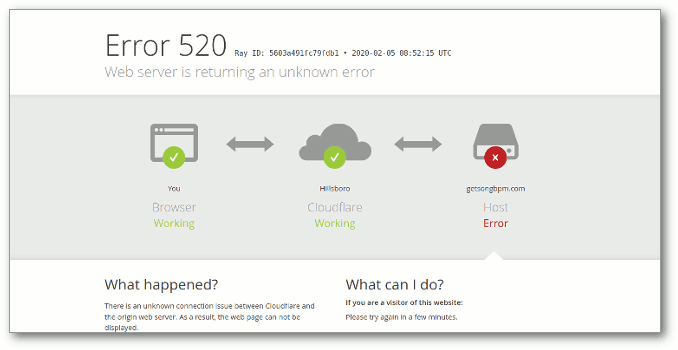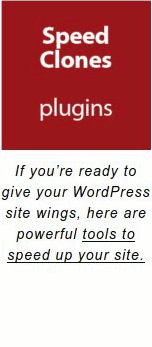Some sites we evaluate for speed testing are using free Cloudflare CDN services. A CDN (content distribution network) is a way to get servers geographically closer to the user and thus reduce latency. That’s the goal anyway.
Cloudflare is a US-based website performance company founded in 2009. Cloudflare claims to improve page load times and performance.
In the recent past, we’ve used free Cloudflare CDN services and their plugin to bulletproof our WordPress websites. Testing, we found Cloudflare doesn’t guarantee consistent load speeds. We saw an unpredictable and random page load times from 10 to 25 seconds. That’s unacceptable even if the average time is one second.

Cloudflare uses a modified version of NGINX – a key Russian-created technology. Nginx (engine-x) is an optimized open-source server software used in the LEMP stack (Linux, Nginx, MySQL, and PHP).
We first thought there was traffic congestion on the shared hosting server. We checked using yougetsignal.com and found only three domains resided on the shared server. One was inactive and the other two had benign, low-traffic content. The server wasn’t our offender.
After plugin testing, it was clear that Cloudflare was the culprit throwing in random delays. We canceled the account and removed the plugin. Then things stabilized. We also got better speed test results in WebPagetest.org. Our cached time improved from 750 milliseconds to a 500-millisecond load. We’re giddy from this discovery.
We’re against any CDN paid or free services. Build with origin optimization. Then there’s no or little benefit from edge optimization. CDN is a band-aid for sloppy site owners. You can’t speed up a site that’s already fast. It’s a waste of money.
One more bad thing about Cloudflare CDN.
Cloudflare’s Nginx servers cause failure on time-to-first-byte measurements (TTFB). Usually shown as a red “F” as in failure or flunk using WebPagetest.org. This negative flag generated a brouhaha, and Cloudflare responded with a special blog entry about the topic and why they think it not a real problem. We agree. TTFB isn’t a problem. Cloudflare flakiness is the problem.
Cloudflare’s claim is “Gzip compression of web pages reduces the time it takes a web page to download, but the compression itself has a cost. That cost causes TTFB to be greater even though the complete download is quicker.” But only on Nginx servers. Apache servers are just fine.
Nginx waits until compression has started before sending the HTTP headers; when compression (Gzip) is turned off it sends the headers immediately. Nowadays, all files are Gzipped for speed.
Our complaint: Who cares about TTFB when Cloudflare throws a monkey wrench into the running engine and randomly gives 10- to 20-seconds page loads? Hiccups aren’t acceptable.
Stop worrying about Time To First Byte (TTFB)
05 Jul 2012 by John Graham-Cumming of Cloudflare. (A lame rebuttal).
Our experience is Cloudflare CDN is notorious for slowing down your site with 500, 501, and 520 server errors. That’s probably where your TTFB errors are coming from. Cloudflare uses NGINX servers instead of Apache. This causes the lazy loading of all Gzip compressed assets. Unnecessary delays. TTFB is the only metric Google uses in its SEO ranking algorithms.
Using Cloudflare would explain the reason for your speed fluctuations. We do not recommend them – nor any CDN for that matter. CDNs are band-aids for poorly optimized websites. It’s better to build quality into your site. That is called origin optimization. CDNs are edge optimization strategy.
Cloudflare ran a test and concluded that time to first byte (TTFB) does not matter. Except, it absolutely does. As they say: if you’re experiment contradicts intuition, check your experiment.
—Ilya Grigorik, Web Performance Engineer at Google

Offsite link: Cloudflare Makes Websites Slower, Not Faster “I noticed that my Cloudflare-enabled sites became much slower and they would often time out.”
“When you put a CDN in front of your website, it will add latency to the TTFB of your dynamic content. Accessing the origin server directly is faster than routing traffic over a CDN. The CDN will improve performance for cacheable elements, but a dynamic page will have to be fetched from the origin server no matter what.” – OFFSITE RESOURCE
Godspeed-
![]()
Steve Teare
performance engineer
May 2024
PagePipe Site Tuning Services for Speed
Instead of band-aid approaches, we drill down to the root cause of your slow site. This is origin optimization. Also known as site tuning. To do this, we analyze site components:
- Hosting
- Theme
- Plugins
- Scripts and third-party services.
- Images and media library.
- We minimize globally loading plugin effects.
Find out more details about Site Tuning – Get Speed!





